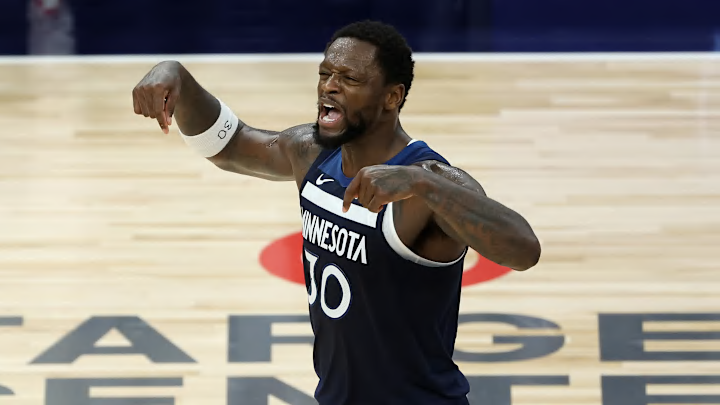As the 2024/25 NBA inches closer to wrapping up, trade rumors are flying faster than seagulls around a bait shop. KD looks like he's heading to the Spurs. The status of Giannis with the Bucks changes from day to day. And no one has any idea what's about to happen with Zion. The Pelicans don't seem to want him anymore, but it's also hard to imagine a team that would at this point.
Unfortunately, some roster decisions end up being made for purely financial reasons. The salary cap and the two luxury tax aprons force teams to stay within a certain spending amount or be penalized. These restrictions played a part in Isaiah Hartenstein leaving the Knicks for OKC, a move that has worked out incredibly well for him.
The Minnesota Timberwolves now find themselves in a similar quandary. Julius Randle, Nickeil Alexander-Walker, and Naz Reid are all either free agents or have player options this summer. And the Wolves would have to re-sign them all for a reported $50 million dollars to stay under the second apron. This is a franchise that is facing some incredibly hard decisions this summer.
How the NBA salary cap works
A salary cap is the maximum amount of money a team can spend on players in a season. It's something that exists in most professional sports leagues. The reason it exists is to promote fairness among the rosters. Otherwise, big market teams with way more money would use their deep pockets to build unbeatable rosters, essentially shutting small markets out from championships.
For the 2024/25 season, the NBA salary cap was set at $140.588 million, a number that seems oddly specific from the outside. It's referred to as a "soft cap" because there are two additional salary levels beyond that. Those are for the luxury taxes, penalties for teams if they go over the cap but stay under those two different levels.
Luxury tax penalties can include a financial component, but there are other potential punishments. Teams that are consistently over the salary cap can receive draft pick penalties. Exceptions to the salary cap can be made, but constantly going over the salary cap can lead to restrictions in those exceptions and their implementation. Basically, teams want to avoid breaking the soft cap.
The Timberwolves' tough cap situation
After being bounced from the playoffs by OKC in the Western Conference Finals, the Timberwolves front office is in full 2025/26 battle plan mode. Their problem is that their current roster exceeded the 2024/25 salary cap by more than $60 million. The Wolves actually have a surprisingly expensive roster. The only team over that second apron more than the Wolves was the Suns.
The current projected salary for the Wolves for 2025/26 is over $192 million dollars. That is assuming both Julius Randle and Naz Reid don't take their player options and stay with the team. These numbers also assume that Nickeil Alexander-Walker, Luka Garza, and selection of other unrestricted free agents do not sign with the team.
At the same time, the salary cap is also projected to go up this year to somewhere around the $154 million mark. The luxury tax aprons will follow. While the increases will help, the franchise is still in a difficult roster situation and likely facing penalties if they don't reign in their spending.
It's also worth noting that Anthony Edwards, Rudy Gobert, Julius Randle, and Jaden McDaniels have relatively hefty contracts accounting for a combined $136, 344, 645.00 of that 2025/26 roster salary. That's already less than $20 million below the projected base salary cap without any free agents factored in. Keeping all of that in mind, the Wolves are left with some tough decisions this off season.
Changes are on the way for the Wolves
At this point, the 2025-26 Timberwolves will likely look different from the 2024-25 iteration. Both Julius Randle and Naz Reid have player options that allow them to walk away and explore the open market for their talents. They could take their player options, then try to negotiate bigger contracts with the Wolves. That would just increase the team's salary cap woes.
On top of that, the Wolves probably don't want to say goodbye to either Alexander-Walker or Garza, two young players who could do great things. But the franchise is in a position where they will likely have to lose some free agents on their roster to make salary cap room. If not, there might be a surprising trade or two from the rest of the roster for draft picks and a little cash.
It's really hard for the Wolves to make any firm plans until Randle and Reid make their decisions. Testing out free agency could bring either player big money but staying with Minnesota puts them in good positions with a contender. Either way, both men are in the driver's seat because they decide how they exercise their player options, not the franchise's front office.
That definitely complicates their Alexander-Walker issue as well as what the team wants to do with the rest of the free agents from the bench. The reality is that the front office is going to have to make some hard decisions over the next few months to stay under the second luxury tax level. Fans need to be ready for some announcements in the off-season that they might not like.
